Impact of Lifestyle on International Student Study Destination Choice
VerifiedAdded on 2021/05/30
|8
|1803
|30
Report
AI Summary
This report investigates the impact of an individual's lifestyle on their decision to choose a particular study destination, specifically focusing on international students. It examines the factors influencing the choice of a Master of Professional Accounting (MPA) program at Charles Sturt University. The report reviews existing literature to understand how lifestyle, encompassing opinions, behaviors, and interests, affects students' decisions. It highlights the influence of social networks, including friends, family, and academic connections, as well as the role of cultural beliefs and understandings. The report emphasizes that recommendations from friends, family, and professors, along with cultural factors, significantly shape students' perceptions and decisions. The study underscores the importance for higher education institutions to consider these factors in their student attraction strategies. The report concludes with four interview questions designed to further explore the impact of these factors on student decision-making processes.
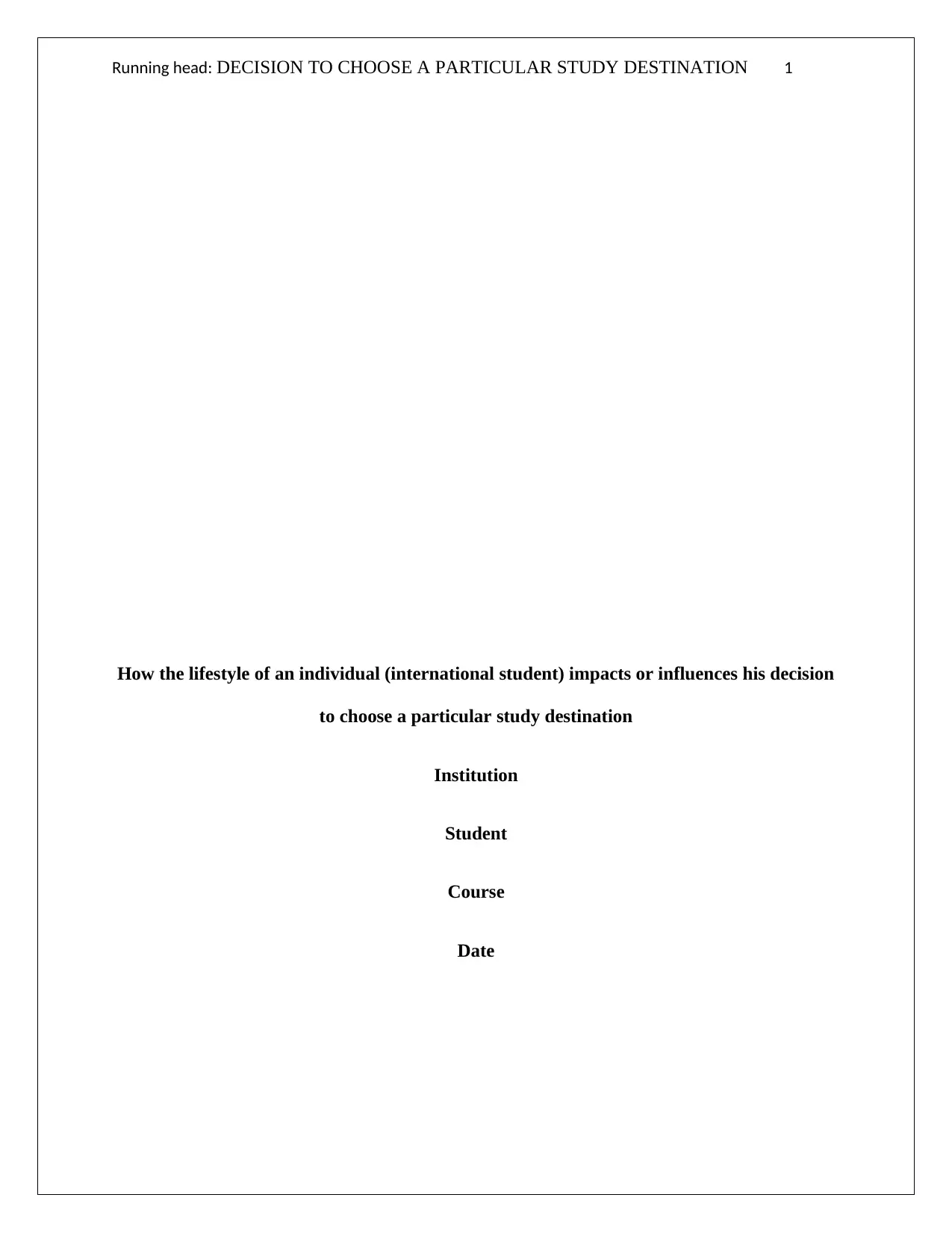
Running head: DECISION TO CHOOSE A PARTICULAR STUDY DESTINATION 1
How the lifestyle of an individual (international student) impacts or influences his decision
to choose a particular study destination
Institution
Student
Course
Date
How the lifestyle of an individual (international student) impacts or influences his decision
to choose a particular study destination
Institution
Student
Course
Date
Paraphrase This Document
Need a fresh take? Get an instant paraphrase of this document with our AI Paraphraser
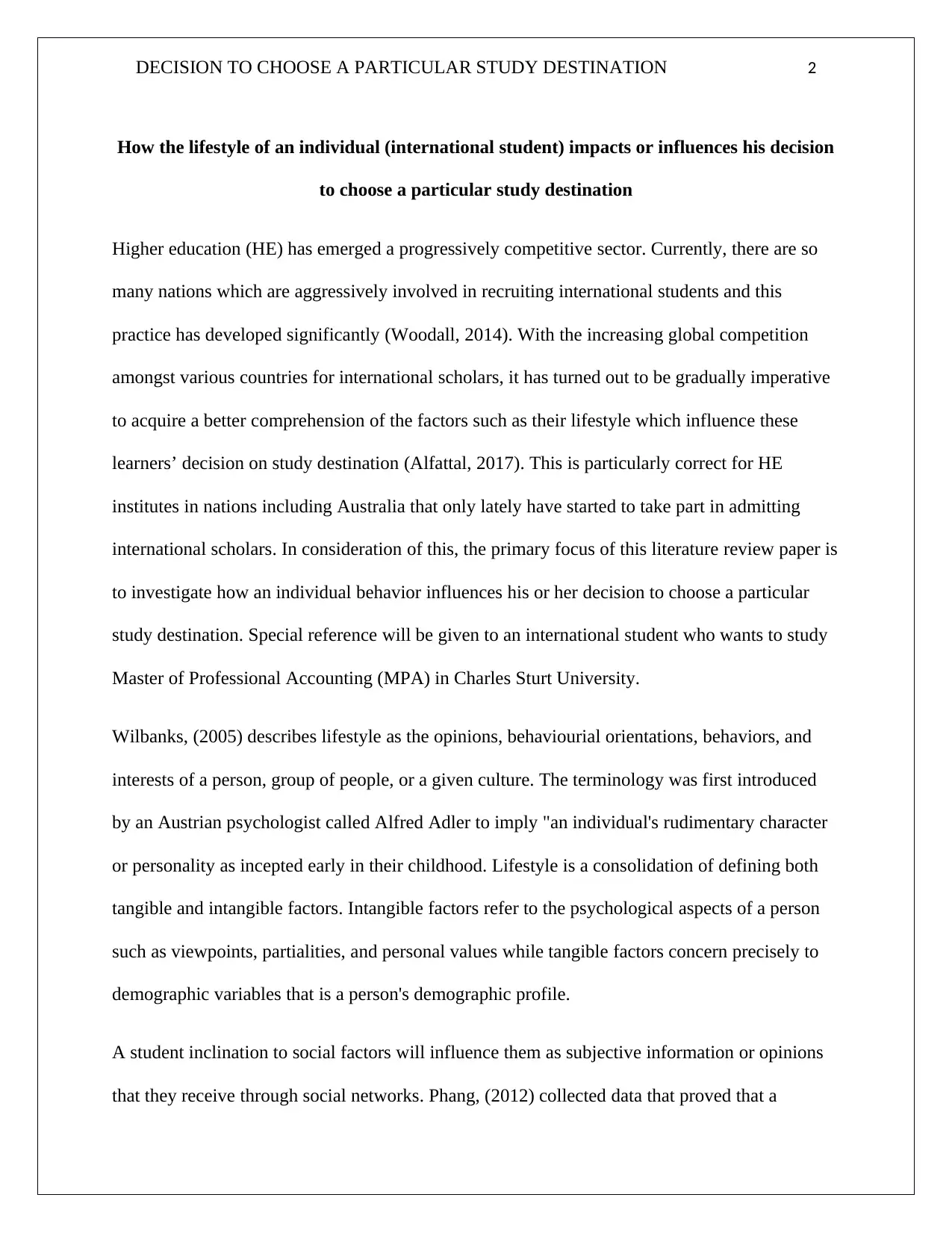
DECISION TO CHOOSE A PARTICULAR STUDY DESTINATION 2
How the lifestyle of an individual (international student) impacts or influences his decision
to choose a particular study destination
Higher education (HE) has emerged a progressively competitive sector. Currently, there are so
many nations which are aggressively involved in recruiting international students and this
practice has developed significantly (Woodall, 2014). With the increasing global competition
amongst various countries for international scholars, it has turned out to be gradually imperative
to acquire a better comprehension of the factors such as their lifestyle which influence these
learners’ decision on study destination (Alfattal, 2017). This is particularly correct for HE
institutes in nations including Australia that only lately have started to take part in admitting
international scholars. In consideration of this, the primary focus of this literature review paper is
to investigate how an individual behavior influences his or her decision to choose a particular
study destination. Special reference will be given to an international student who wants to study
Master of Professional Accounting (MPA) in Charles Sturt University.
Wilbanks, (2005) describes lifestyle as the opinions, behaviourial orientations, behaviors, and
interests of a person, group of people, or a given culture. The terminology was first introduced
by an Austrian psychologist called Alfred Adler to imply "an individual's rudimentary character
or personality as incepted early in their childhood. Lifestyle is a consolidation of defining both
tangible and intangible factors. Intangible factors refer to the psychological aspects of a person
such as viewpoints, partialities, and personal values while tangible factors concern precisely to
demographic variables that is a person's demographic profile.
A student inclination to social factors will influence them as subjective information or opinions
that they receive through social networks. Phang, (2012) collected data that proved that a
How the lifestyle of an individual (international student) impacts or influences his decision
to choose a particular study destination
Higher education (HE) has emerged a progressively competitive sector. Currently, there are so
many nations which are aggressively involved in recruiting international students and this
practice has developed significantly (Woodall, 2014). With the increasing global competition
amongst various countries for international scholars, it has turned out to be gradually imperative
to acquire a better comprehension of the factors such as their lifestyle which influence these
learners’ decision on study destination (Alfattal, 2017). This is particularly correct for HE
institutes in nations including Australia that only lately have started to take part in admitting
international scholars. In consideration of this, the primary focus of this literature review paper is
to investigate how an individual behavior influences his or her decision to choose a particular
study destination. Special reference will be given to an international student who wants to study
Master of Professional Accounting (MPA) in Charles Sturt University.
Wilbanks, (2005) describes lifestyle as the opinions, behaviourial orientations, behaviors, and
interests of a person, group of people, or a given culture. The terminology was first introduced
by an Austrian psychologist called Alfred Adler to imply "an individual's rudimentary character
or personality as incepted early in their childhood. Lifestyle is a consolidation of defining both
tangible and intangible factors. Intangible factors refer to the psychological aspects of a person
such as viewpoints, partialities, and personal values while tangible factors concern precisely to
demographic variables that is a person's demographic profile.
A student inclination to social factors will influence them as subjective information or opinions
that they receive through social networks. Phang, (2012) collected data that proved that a
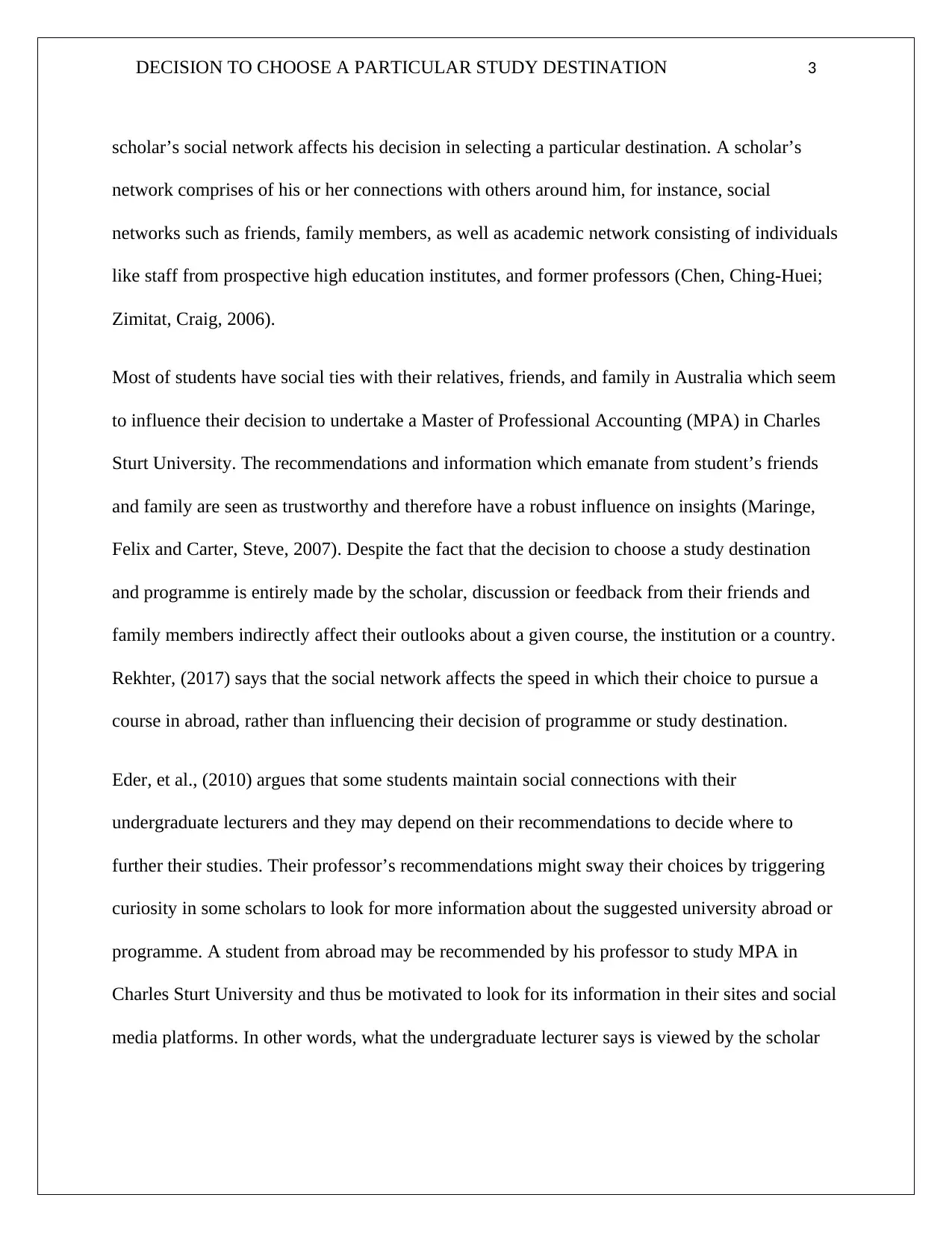
DECISION TO CHOOSE A PARTICULAR STUDY DESTINATION 3
scholar’s social network affects his decision in selecting a particular destination. A scholar’s
network comprises of his or her connections with others around him, for instance, social
networks such as friends, family members, as well as academic network consisting of individuals
like staff from prospective high education institutes, and former professors (Chen, Ching-Huei;
Zimitat, Craig, 2006).
Most of students have social ties with their relatives, friends, and family in Australia which seem
to influence their decision to undertake a Master of Professional Accounting (MPA) in Charles
Sturt University. The recommendations and information which emanate from student’s friends
and family are seen as trustworthy and therefore have a robust influence on insights (Maringe,
Felix and Carter, Steve, 2007). Despite the fact that the decision to choose a study destination
and programme is entirely made by the scholar, discussion or feedback from their friends and
family members indirectly affect their outlooks about a given course, the institution or a country.
Rekhter, (2017) says that the social network affects the speed in which their choice to pursue a
course in abroad, rather than influencing their decision of programme or study destination.
Eder, et al., (2010) argues that some students maintain social connections with their
undergraduate lecturers and they may depend on their recommendations to decide where to
further their studies. Their professor’s recommendations might sway their choices by triggering
curiosity in some scholars to look for more information about the suggested university abroad or
programme. A student from abroad may be recommended by his professor to study MPA in
Charles Sturt University and thus be motivated to look for its information in their sites and social
media platforms. In other words, what the undergraduate lecturer says is viewed by the scholar
scholar’s social network affects his decision in selecting a particular destination. A scholar’s
network comprises of his or her connections with others around him, for instance, social
networks such as friends, family members, as well as academic network consisting of individuals
like staff from prospective high education institutes, and former professors (Chen, Ching-Huei;
Zimitat, Craig, 2006).
Most of students have social ties with their relatives, friends, and family in Australia which seem
to influence their decision to undertake a Master of Professional Accounting (MPA) in Charles
Sturt University. The recommendations and information which emanate from student’s friends
and family are seen as trustworthy and therefore have a robust influence on insights (Maringe,
Felix and Carter, Steve, 2007). Despite the fact that the decision to choose a study destination
and programme is entirely made by the scholar, discussion or feedback from their friends and
family members indirectly affect their outlooks about a given course, the institution or a country.
Rekhter, (2017) says that the social network affects the speed in which their choice to pursue a
course in abroad, rather than influencing their decision of programme or study destination.
Eder, et al., (2010) argues that some students maintain social connections with their
undergraduate lecturers and they may depend on their recommendations to decide where to
further their studies. Their professor’s recommendations might sway their choices by triggering
curiosity in some scholars to look for more information about the suggested university abroad or
programme. A student from abroad may be recommended by his professor to study MPA in
Charles Sturt University and thus be motivated to look for its information in their sites and social
media platforms. In other words, what the undergraduate lecturer says is viewed by the scholar
⊘ This is a preview!⊘
Do you want full access?
Subscribe today to unlock all pages.

Trusted by 1+ million students worldwide
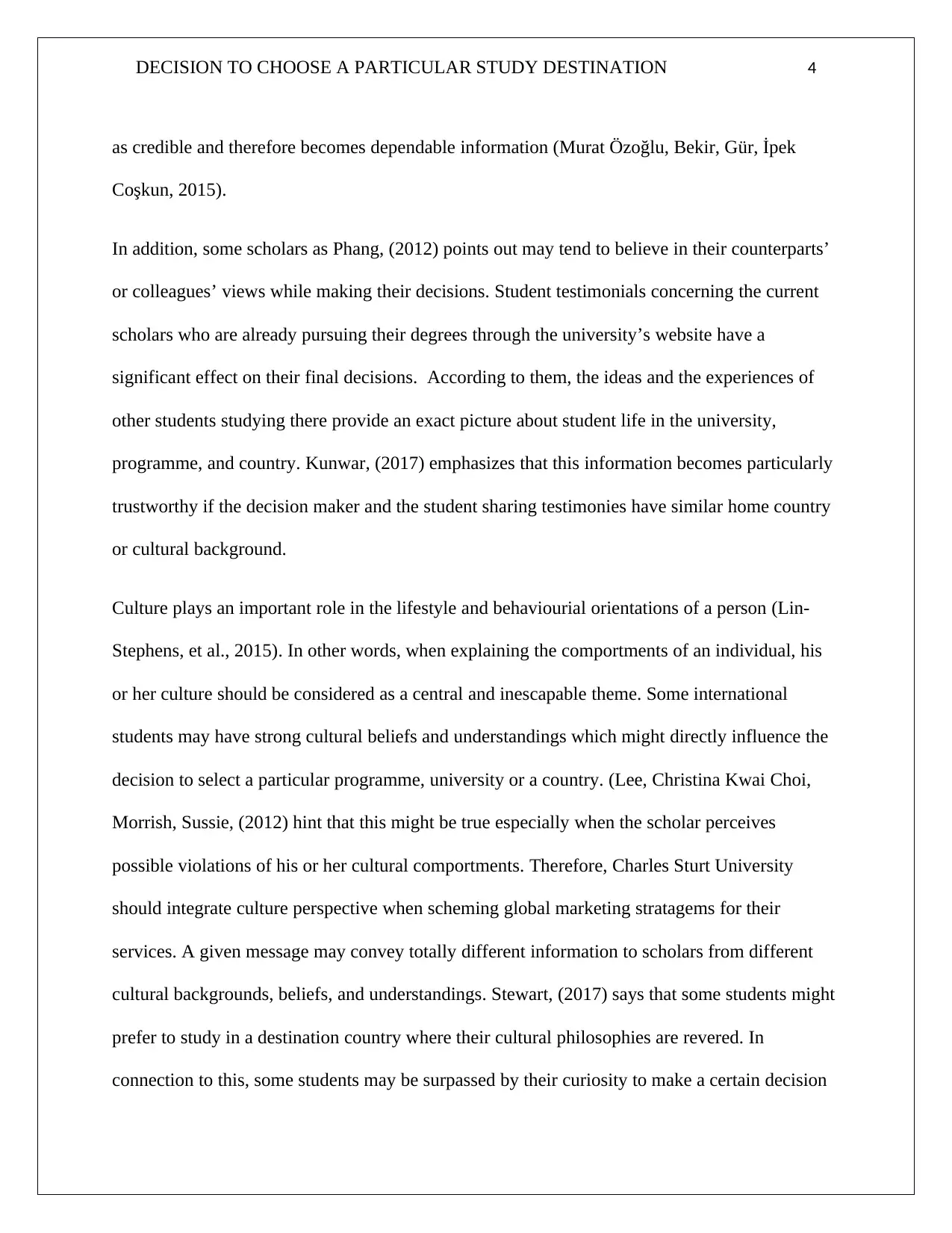
DECISION TO CHOOSE A PARTICULAR STUDY DESTINATION 4
as credible and therefore becomes dependable information (Murat Özoğlu, Bekir, Gür, İpek
Coşkun, 2015).
In addition, some scholars as Phang, (2012) points out may tend to believe in their counterparts’
or colleagues’ views while making their decisions. Student testimonials concerning the current
scholars who are already pursuing their degrees through the university’s website have a
significant effect on their final decisions. According to them, the ideas and the experiences of
other students studying there provide an exact picture about student life in the university,
programme, and country. Kunwar, (2017) emphasizes that this information becomes particularly
trustworthy if the decision maker and the student sharing testimonies have similar home country
or cultural background.
Culture plays an important role in the lifestyle and behaviourial orientations of a person (Lin-
Stephens, et al., 2015). In other words, when explaining the comportments of an individual, his
or her culture should be considered as a central and inescapable theme. Some international
students may have strong cultural beliefs and understandings which might directly influence the
decision to select a particular programme, university or a country. (Lee, Christina Kwai Choi,
Morrish, Sussie, (2012) hint that this might be true especially when the scholar perceives
possible violations of his or her cultural comportments. Therefore, Charles Sturt University
should integrate culture perspective when scheming global marketing stratagems for their
services. A given message may convey totally different information to scholars from different
cultural backgrounds, beliefs, and understandings. Stewart, (2017) says that some students might
prefer to study in a destination country where their cultural philosophies are revered. In
connection to this, some students may be surpassed by their curiosity to make a certain decision
as credible and therefore becomes dependable information (Murat Özoğlu, Bekir, Gür, İpek
Coşkun, 2015).
In addition, some scholars as Phang, (2012) points out may tend to believe in their counterparts’
or colleagues’ views while making their decisions. Student testimonials concerning the current
scholars who are already pursuing their degrees through the university’s website have a
significant effect on their final decisions. According to them, the ideas and the experiences of
other students studying there provide an exact picture about student life in the university,
programme, and country. Kunwar, (2017) emphasizes that this information becomes particularly
trustworthy if the decision maker and the student sharing testimonies have similar home country
or cultural background.
Culture plays an important role in the lifestyle and behaviourial orientations of a person (Lin-
Stephens, et al., 2015). In other words, when explaining the comportments of an individual, his
or her culture should be considered as a central and inescapable theme. Some international
students may have strong cultural beliefs and understandings which might directly influence the
decision to select a particular programme, university or a country. (Lee, Christina Kwai Choi,
Morrish, Sussie, (2012) hint that this might be true especially when the scholar perceives
possible violations of his or her cultural comportments. Therefore, Charles Sturt University
should integrate culture perspective when scheming global marketing stratagems for their
services. A given message may convey totally different information to scholars from different
cultural backgrounds, beliefs, and understandings. Stewart, (2017) says that some students might
prefer to study in a destination country where their cultural philosophies are revered. In
connection to this, some students may be surpassed by their curiosity to make a certain decision
Paraphrase This Document
Need a fresh take? Get an instant paraphrase of this document with our AI Paraphraser
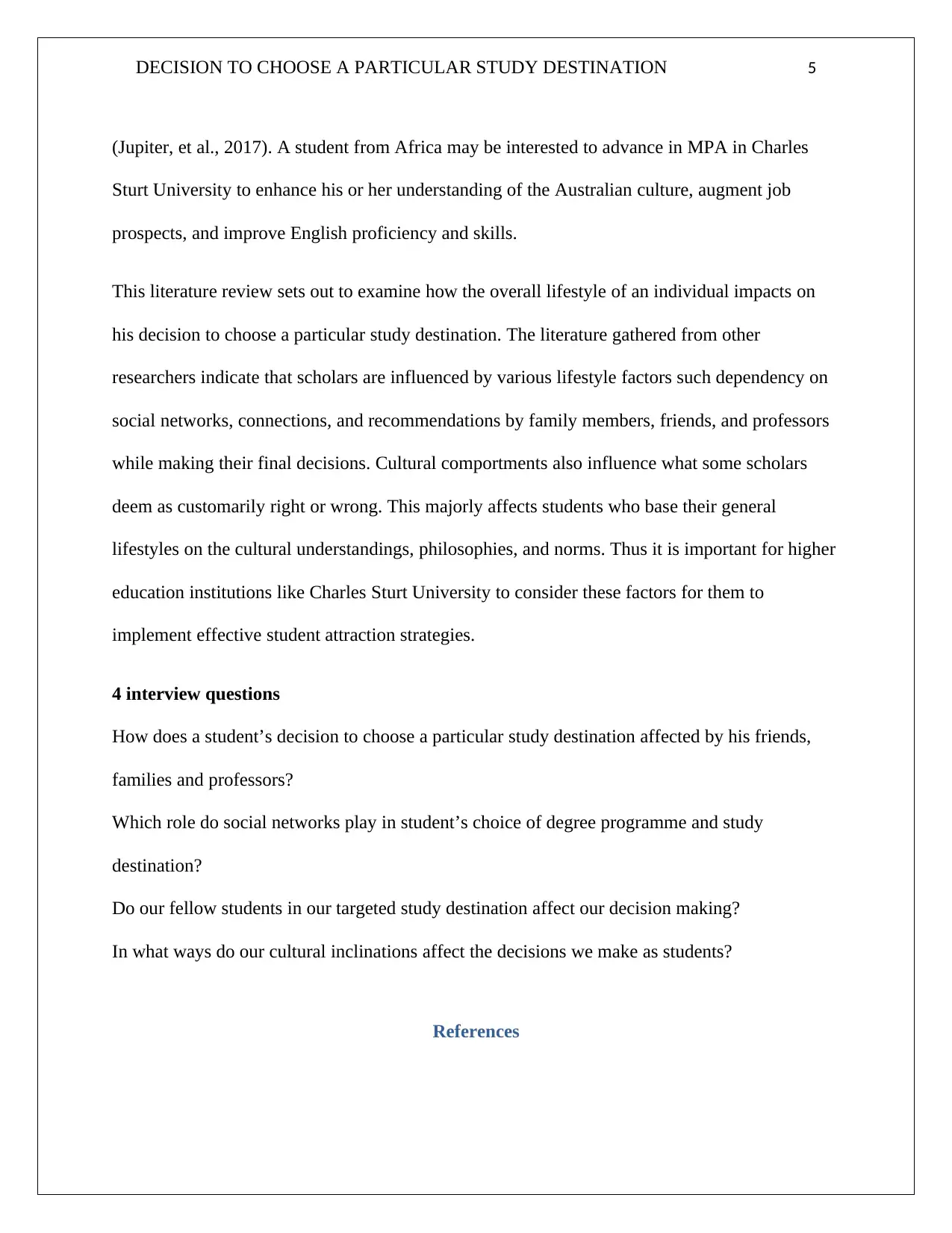
DECISION TO CHOOSE A PARTICULAR STUDY DESTINATION 5
(Jupiter, et al., 2017). A student from Africa may be interested to advance in MPA in Charles
Sturt University to enhance his or her understanding of the Australian culture, augment job
prospects, and improve English proficiency and skills.
This literature review sets out to examine how the overall lifestyle of an individual impacts on
his decision to choose a particular study destination. The literature gathered from other
researchers indicate that scholars are influenced by various lifestyle factors such dependency on
social networks, connections, and recommendations by family members, friends, and professors
while making their final decisions. Cultural comportments also influence what some scholars
deem as customarily right or wrong. This majorly affects students who base their general
lifestyles on the cultural understandings, philosophies, and norms. Thus it is important for higher
education institutions like Charles Sturt University to consider these factors for them to
implement effective student attraction strategies.
4 interview questions
How does a student’s decision to choose a particular study destination affected by his friends,
families and professors?
Which role do social networks play in student’s choice of degree programme and study
destination?
Do our fellow students in our targeted study destination affect our decision making?
In what ways do our cultural inclinations affect the decisions we make as students?
References
(Jupiter, et al., 2017). A student from Africa may be interested to advance in MPA in Charles
Sturt University to enhance his or her understanding of the Australian culture, augment job
prospects, and improve English proficiency and skills.
This literature review sets out to examine how the overall lifestyle of an individual impacts on
his decision to choose a particular study destination. The literature gathered from other
researchers indicate that scholars are influenced by various lifestyle factors such dependency on
social networks, connections, and recommendations by family members, friends, and professors
while making their final decisions. Cultural comportments also influence what some scholars
deem as customarily right or wrong. This majorly affects students who base their general
lifestyles on the cultural understandings, philosophies, and norms. Thus it is important for higher
education institutions like Charles Sturt University to consider these factors for them to
implement effective student attraction strategies.
4 interview questions
How does a student’s decision to choose a particular study destination affected by his friends,
families and professors?
Which role do social networks play in student’s choice of degree programme and study
destination?
Do our fellow students in our targeted study destination affect our decision making?
In what ways do our cultural inclinations affect the decisions we make as students?
References
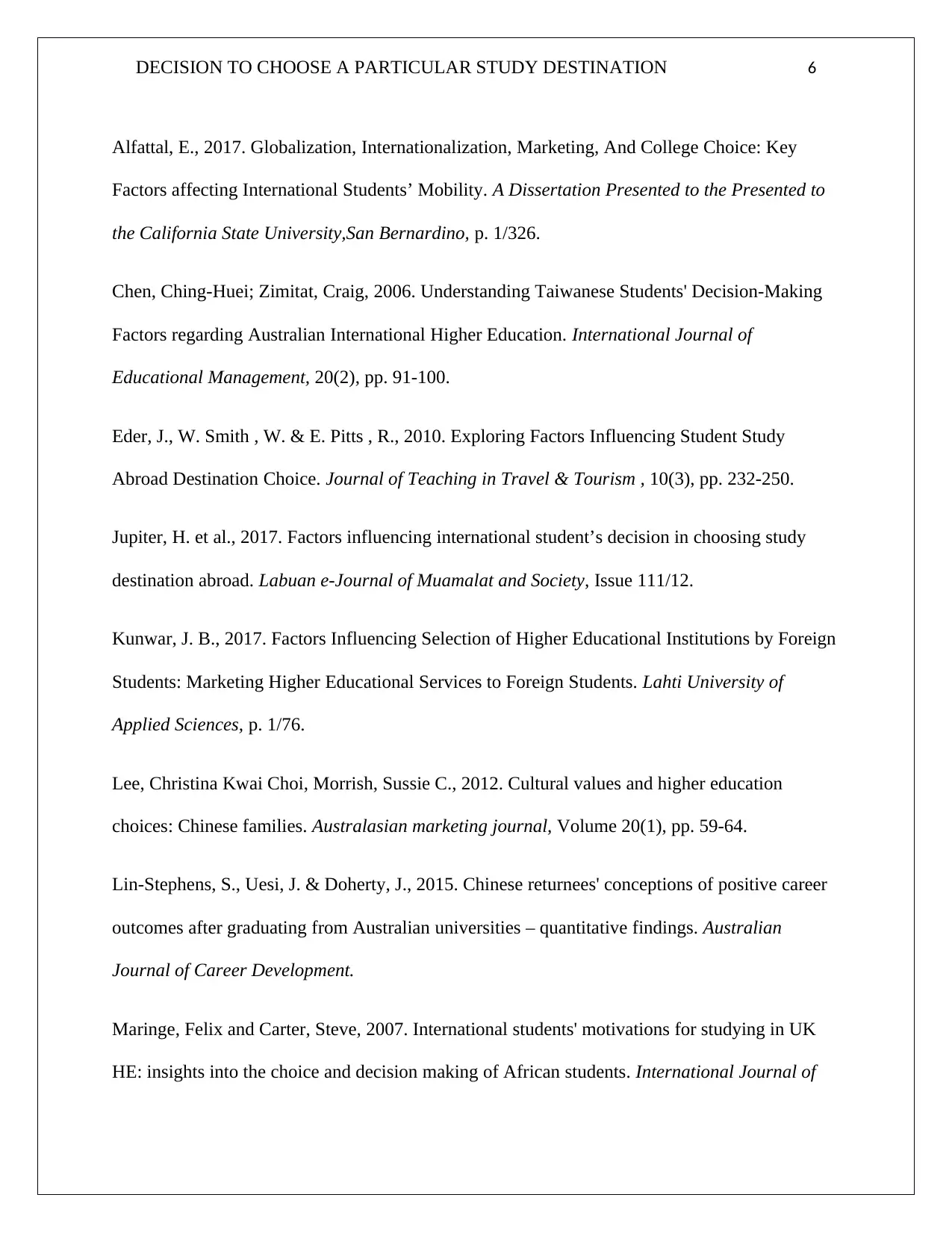
DECISION TO CHOOSE A PARTICULAR STUDY DESTINATION 6
Alfattal, E., 2017. Globalization, Internationalization, Marketing, And College Choice: Key
Factors affecting International Students’ Mobility. A Dissertation Presented to the Presented to
the California State University,San Bernardino, p. 1/326.
Chen, Ching-Huei; Zimitat, Craig, 2006. Understanding Taiwanese Students' Decision-Making
Factors regarding Australian International Higher Education. International Journal of
Educational Management, 20(2), pp. 91-100.
Eder, J., W. Smith , W. & E. Pitts , R., 2010. Exploring Factors Influencing Student Study
Abroad Destination Choice. Journal of Teaching in Travel & Tourism , 10(3), pp. 232-250.
Jupiter, H. et al., 2017. Factors influencing international student’s decision in choosing study
destination abroad. Labuan e-Journal of Muamalat and Society, Issue 111/12.
Kunwar, J. B., 2017. Factors Influencing Selection of Higher Educational Institutions by Foreign
Students: Marketing Higher Educational Services to Foreign Students. Lahti University of
Applied Sciences, p. 1/76.
Lee, Christina Kwai Choi, Morrish, Sussie C., 2012. Cultural values and higher education
choices: Chinese families. Australasian marketing journal, Volume 20(1), pp. 59-64.
Lin-Stephens, S., Uesi, J. & Doherty, J., 2015. Chinese returnees' conceptions of positive career
outcomes after graduating from Australian universities – quantitative findings. Australian
Journal of Career Development.
Maringe, Felix and Carter, Steve, 2007. International students' motivations for studying in UK
HE: insights into the choice and decision making of African students. International Journal of
Alfattal, E., 2017. Globalization, Internationalization, Marketing, And College Choice: Key
Factors affecting International Students’ Mobility. A Dissertation Presented to the Presented to
the California State University,San Bernardino, p. 1/326.
Chen, Ching-Huei; Zimitat, Craig, 2006. Understanding Taiwanese Students' Decision-Making
Factors regarding Australian International Higher Education. International Journal of
Educational Management, 20(2), pp. 91-100.
Eder, J., W. Smith , W. & E. Pitts , R., 2010. Exploring Factors Influencing Student Study
Abroad Destination Choice. Journal of Teaching in Travel & Tourism , 10(3), pp. 232-250.
Jupiter, H. et al., 2017. Factors influencing international student’s decision in choosing study
destination abroad. Labuan e-Journal of Muamalat and Society, Issue 111/12.
Kunwar, J. B., 2017. Factors Influencing Selection of Higher Educational Institutions by Foreign
Students: Marketing Higher Educational Services to Foreign Students. Lahti University of
Applied Sciences, p. 1/76.
Lee, Christina Kwai Choi, Morrish, Sussie C., 2012. Cultural values and higher education
choices: Chinese families. Australasian marketing journal, Volume 20(1), pp. 59-64.
Lin-Stephens, S., Uesi, J. & Doherty, J., 2015. Chinese returnees' conceptions of positive career
outcomes after graduating from Australian universities – quantitative findings. Australian
Journal of Career Development.
Maringe, Felix and Carter, Steve, 2007. International students' motivations for studying in UK
HE: insights into the choice and decision making of African students. International Journal of
⊘ This is a preview!⊘
Do you want full access?
Subscribe today to unlock all pages.

Trusted by 1+ million students worldwide
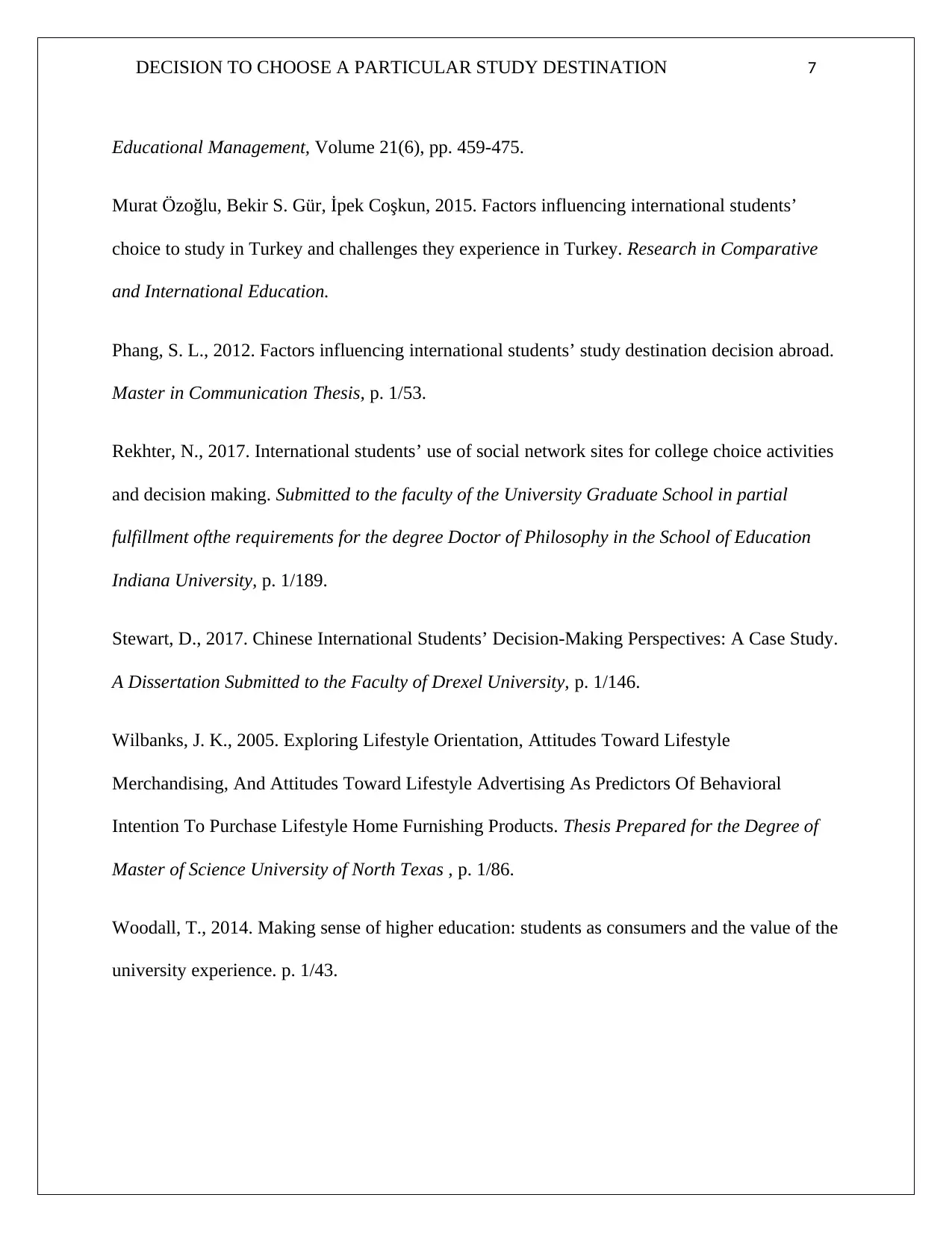
DECISION TO CHOOSE A PARTICULAR STUDY DESTINATION 7
Educational Management, Volume 21(6), pp. 459-475.
Murat Özoğlu, Bekir S. Gür, İpek Coşkun, 2015. Factors influencing international students’
choice to study in Turkey and challenges they experience in Turkey. Research in Comparative
and International Education.
Phang, S. L., 2012. Factors influencing international students’ study destination decision abroad.
Master in Communication Thesis, p. 1/53.
Rekhter, N., 2017. International students’ use of social network sites for college choice activities
and decision making. Submitted to the faculty of the University Graduate School in partial
fulfillment ofthe requirements for the degree Doctor of Philosophy in the School of Education
Indiana University, p. 1/189.
Stewart, D., 2017. Chinese International Students’ Decision-Making Perspectives: A Case Study.
A Dissertation Submitted to the Faculty of Drexel University, p. 1/146.
Wilbanks, J. K., 2005. Exploring Lifestyle Orientation, Attitudes Toward Lifestyle
Merchandising, And Attitudes Toward Lifestyle Advertising As Predictors Of Behavioral
Intention To Purchase Lifestyle Home Furnishing Products. Thesis Prepared for the Degree of
Master of Science University of North Texas , p. 1/86.
Woodall, T., 2014. Making sense of higher education: students as consumers and the value of the
university experience. p. 1/43.
Educational Management, Volume 21(6), pp. 459-475.
Murat Özoğlu, Bekir S. Gür, İpek Coşkun, 2015. Factors influencing international students’
choice to study in Turkey and challenges they experience in Turkey. Research in Comparative
and International Education.
Phang, S. L., 2012. Factors influencing international students’ study destination decision abroad.
Master in Communication Thesis, p. 1/53.
Rekhter, N., 2017. International students’ use of social network sites for college choice activities
and decision making. Submitted to the faculty of the University Graduate School in partial
fulfillment ofthe requirements for the degree Doctor of Philosophy in the School of Education
Indiana University, p. 1/189.
Stewart, D., 2017. Chinese International Students’ Decision-Making Perspectives: A Case Study.
A Dissertation Submitted to the Faculty of Drexel University, p. 1/146.
Wilbanks, J. K., 2005. Exploring Lifestyle Orientation, Attitudes Toward Lifestyle
Merchandising, And Attitudes Toward Lifestyle Advertising As Predictors Of Behavioral
Intention To Purchase Lifestyle Home Furnishing Products. Thesis Prepared for the Degree of
Master of Science University of North Texas , p. 1/86.
Woodall, T., 2014. Making sense of higher education: students as consumers and the value of the
university experience. p. 1/43.
Paraphrase This Document
Need a fresh take? Get an instant paraphrase of this document with our AI Paraphraser
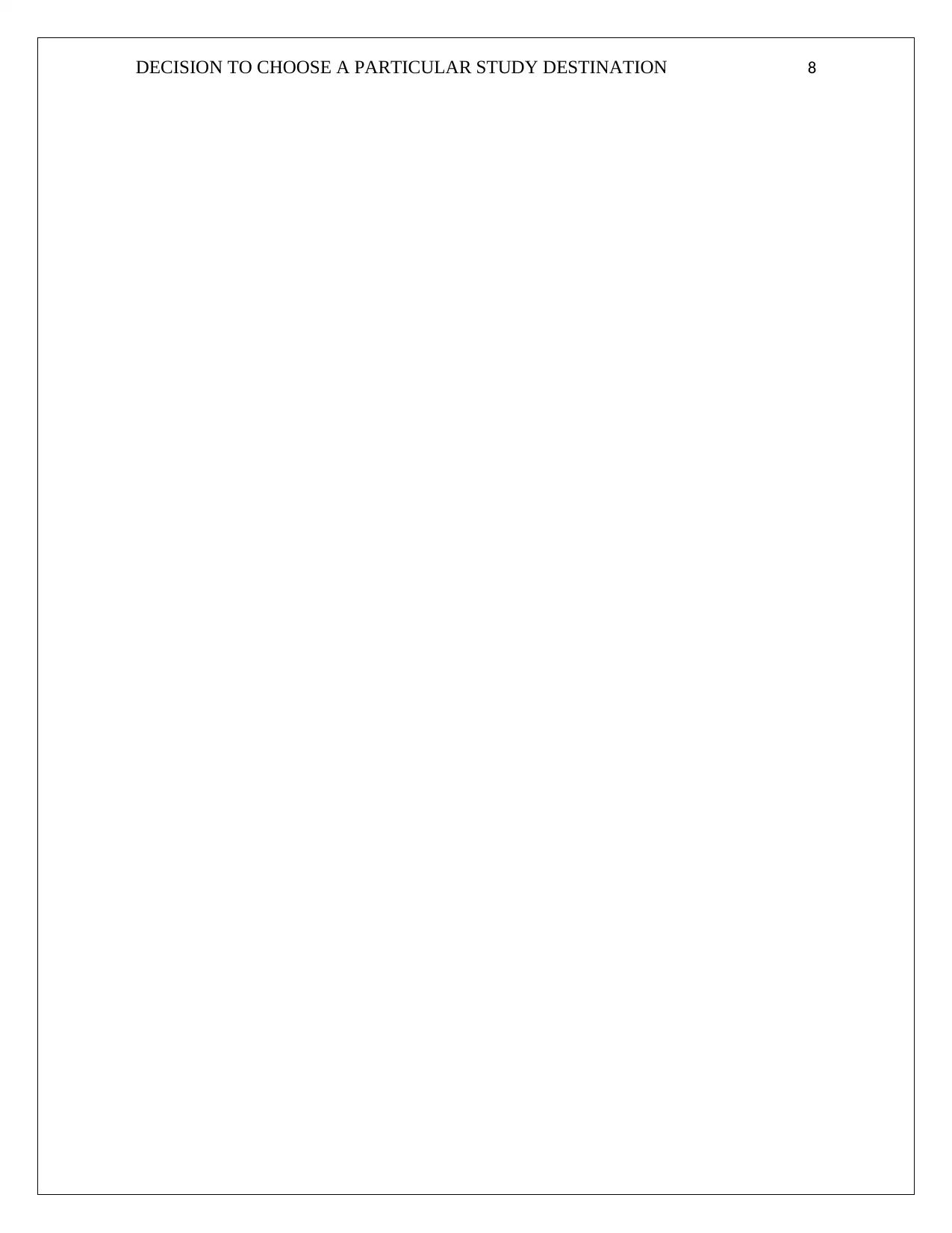
DECISION TO CHOOSE A PARTICULAR STUDY DESTINATION 8
1 out of 8
Related Documents
Your All-in-One AI-Powered Toolkit for Academic Success.
+13062052269
info@desklib.com
Available 24*7 on WhatsApp / Email
![[object Object]](/_next/static/media/star-bottom.7253800d.svg)
Unlock your academic potential
Copyright © 2020–2026 A2Z Services. All Rights Reserved. Developed and managed by ZUCOL.




